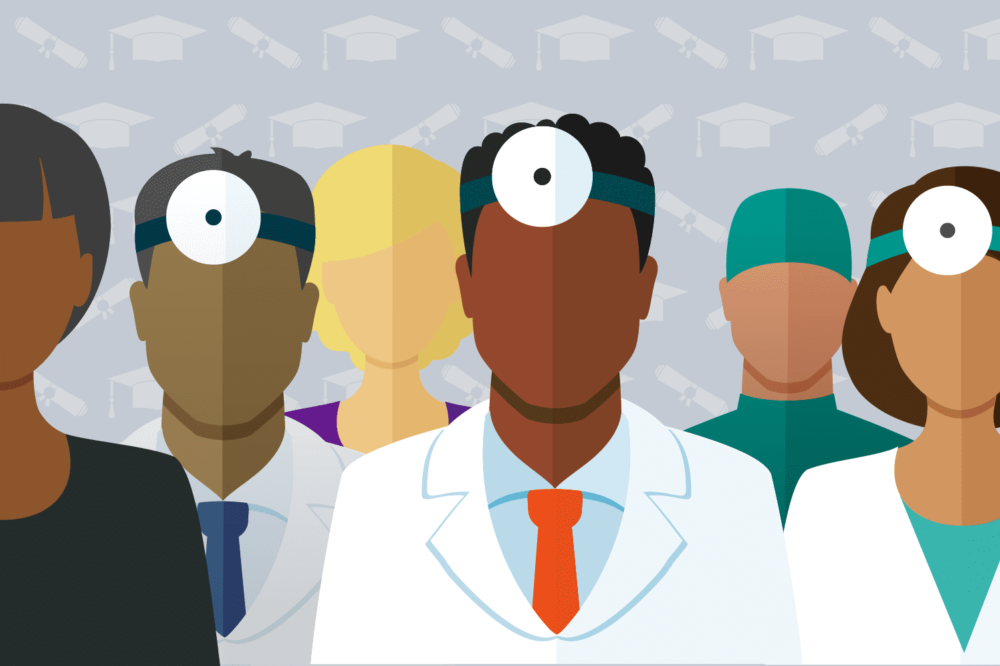
Table of Contents
As you prepare to write medical school secondary essays, plan to see a question about diversity on the essay prompts for most schools. This can feel like a tricky secondary essay prompt, as it’s a much easier question for some students to answer than others.
But even if you don’t see yourself as diverse racially or socioeconomically compared to other applicants, you still have unique experiences and perspectives to offer your top choice medical school.
Diversity in medical school isn’t just about ethnicity or economic background; it’s about the distinct qualities and life experiences that make you unique. You can showcase your unique contributions on your med school applications, whether you have an unexpected hobby, nontraditional gender identity, international experience, or an unusual academic background.
Here’s the advice I and my fellow Physician Advisors and Writing Advisors give to students looking to impress AdComs on their secondaries.
What Is the Medical School Diversity Essay?
Many medical programs (such as the Mayo Clinical College of Medicine, the University of Massachusetts, and Stanford University School of Medicine) include a question in their secondary application process about how applicants will contribute to the diversity of the student body.
This prompt, often called the “diversity essay,” is designed to help admissions committees understand each applicant’s unique qualities, experiences, and perspectives. It’s important to note that this is not necessarily the same as an “adversity” prompt, which focuses on challenges and hardships.
While some schools might combine adversity and diversity statements, the diversity essay prompt specifically highlights how your uniqueness and background will enrich your medical school class on your journey to becoming a doctor.
Common Topics and Themes to Address
The diversity question relates to multiple competencies added by the AAMC in 2024. When writing your application essays (or preparing for your interviews), you can explore a variety of topics and themes to showcase your unique experiences and perspectives.
If you’re not from a particularly disadvantaged background, not to worry! You’re still an individual who can contribute to the diversity of a student body.
Here are some common and not-so-obvious themes to consider in your essay questions:
- Socioeconomic status: Highlight your unique socioeconomic background, whether marked by wealth or financial hardships, and how your relationship with money shaped your perspective, privilege, and resilience.
- Significant life events: Discuss significant events that have impacted your worldview and resilience. This may be anything from traumatic experiences to the loss of a parent or even something you experienced as a member of your community that shaped you.
- Racial identity: Share how your racial or ethnic background has influenced your experiences and interactions.
- Experiencing healthcare disparities: Describe personal encounters with healthcare inequities and how they have motivated you to pursue medicine.
- Physical disabilities: Explain how living with a disability has shaped your understanding of patient care and empathy.
- Gender and/or sexual identity: Reflect on your experiences as a member of the LGBTQ+ community and how your sexual orientation and/or gender identity have influenced your perspective.
- Neurodivergence: Discuss how conditions like ADHD, autism, or other neurodivergent traits have contributed to your unique problem-solving and patient-care approach.
- Unique or rare physical traits: Highlight characteristics such as unique skin conditions, being very under or overweight, Polydactyly (being born with extra fingers), or having distinctive birthmarks and how these have impacted your life.
- Insecurities you have overcome: Share personal challenges and how overcoming them has contributed to your growth, such as an unhealthy drive towards perfectionism or a body image disorder.
- Family circumstances: Describe unique family dynamics, such as being a caretaker for a family member, that have shaped your sense of responsibility and empathy.
- Religion/faith background: Reflect on how your religious or spiritual beliefs have influenced your values and commitment to service. Explain how your beliefs may now diverge from your family’s religious beliefs and how this has affected your educational and career paths.
- Cultural heritage: Discuss traditions, customs, and values from your cultural background and how they have influenced your identity and aspirations.
- Immigration experience: Share the challenges and perspectives gained from being an immigrant or coming from an immigrant family.
- Educational path: Highlight non-traditional or unique academic journeys, such as switching majors or pursuing unconventional fields of study.
- Work experiences: Reflect on diverse job experiences, especially those in healthcare or community service, and what you have learned from them.
- Volunteer work and community involvement: Discuss your commitment to volunteering and its impact on understanding diverse communities. Talk about how these experiences taught you the importance of teamwork, sensitivity, and belonging.
- Hobbies and interests: Showcase unique hobbies or interests that have contributed to your personal development and perspective. These don’t have to be related to medicine but should relate in some way to your journey in growing as a person and future physician.
- Global perspective: Describing experiences abroad, such as study or volunteer work in different countries, and how they have broadened your worldview.
- Leadership roles: Reflect on your leadership positions and how they have prepared you to contribute to a diverse medical school community.
- Interpersonal skills: Highlight your ability to work effectively with diverse groups of people and what you have learned from those interactions.
Read Next: How To Fill Out the AMCAS Application
Why Is Diversity Important in Medical School?
Diversity has become a primary focus for medical schools when evaluating applicants, and for good reason.
With the Supreme Court’s ruling on Affirmative Action limiting race-based considerations, many medical schools have turned to the diversity essay to understand and value all applicants’ unique experiences and perspectives. This shift allows schools to continue fostering a diverse student body through a more holistic review process.
It is common knowledge that the medical field has historically been dominated by male white and Asian physicians, leading to a lack of representation for other racial and ethnic groups. This disparity can impact patient care, as studies have shown that patients often receive better care when treated by doctors who share their cultural and linguistic backgrounds.
By promoting diversity in medical school admissions, institutions aim to create a more representative healthcare workforce to serve an increasingly diverse patient population better.
Another reason diversity is important is that Historically Black Colleges and Universities (HBCUs) and Historically Black Medical Schools (HBMSs) have long struggled with underfunding and lower enrollment numbers than their predominantly white counterparts.
Increasing diversity within all medical schools can help address these disparities by ensuring that students from underrepresented backgrounds have equal opportunities to pursue medical careers, regardless of their institution.
Last but certainly not least, medical school diversity enriches all students’ learning environment. When you interact with peers from different backgrounds, it fosters cultural competency, empathy, and collaboration — essential skills for future healthcare providers.
These interactions prepare medical students to work effectively in diverse teams and understand the complex social determinants of health affecting patient care.
Not from a ‘Disadvantaged Background’? You Still Have Something to Say.
There is a common misconception that a med student’s diversity only relates to skin color or cultural heritage. That is simply not true. Even if you don’t come from a traditionally diverse background, you still have unique qualities and experiences that can contribute to a diverse student body.
Some of my favorite diversity essays from former students have come from unique stories that weren’t about culture or socioeconomic status. For instance, I once worked with a competitive ballerina who discussed her extensive training as part of diversity essay questions.
Maybe you chose an unconventional major, like art or music, and can talk about your unique approach to problem-solving and innovation. You may have grown up in America, but have you spent time traveling internationally? Or perhaps you have skills from fields that are seemingly unrelated to medicine, like computer programming or graphic design, that can spark inspiration for your essay.
Diversity Essay Examples
Need inspiration to get started? Below, I include three real-life diversity essays from students accepted by the requesting programs. Each paints a different picture of how diversity can be expressed in this essay format to show how you’ll be able to contribute to a diverse medical school community. (Names have been removed for confidentiality.)
Example 1: A Second-Generation Asian American (272 Words/1837 Characters)
Prompt: Do you identify as being part of a marginalized group socioeconomically or in terms of access to quality education or healthcare? Please describe how this inequity has impacted you and your community. (350 words max)
Essay: When the Asian, Asian American, and Pacific Islander (AAPI) community experienced a resurgence in anti-Asian hate during the COVID-19 pandemic, many of us feared for our elderly, experienced physical assaults, and endured constant streams of microaggressions. All these effects led to consequences for my community’s mental health and revealed gaps in mental healthcare for AAPI. As a second-generation Asian American, I have experienced the conflict of identity created by the generational gap between immigrant parents and children, and the surge in anti-Asian hatred compounded these stressors. The stigma against mental illness within our community discourages many of us from seeking treatment, and the increased demand for mental health care led to services becoming more inaccessible. I dedicated myself to addressing this gap by organizing virtual activities and dissemination of resources. Many of my fellow students struggled to adapt to the sudden change to virtual curriculum and social distancing; our goal was to maintain a network for students to discuss their experience, seek support from peers, and empower our communities. Another area that demonstrates the long-lasting effects of COVID-19 is food insecurity. While visiting my grandparents in their assisted living facility, I learned that many residents struggled to access affordable and healthy food. After reaching out to local food banks, I registered as a recurring volunteer. Using my fluency in Mandarin and basic Spanish, I can comfort and serve families who are struggling with the consequences of COVID-19 and recent economic changes. With the knowledge I gained from these experiences, I aspire to continue working to address disparities, advocate for underserved populations, and provide accessible and culturally appropriate care as a future physician.
Example 2: When Cultures Collide in Unity (373 Words/2399 Characters)
Prompt: Describe your identity and how it has impacted the development of your values and attitudes toward individuals different from yourself and how this will impact your interactions with future colleagues and patients. (2500 characters max)
Essay: Growing up, I traveled to India during summers to visit my family. Living in India for months at a time allowed me to understand the rich history of my ancestral homeland, Hyderabad. Unlike other parts of India, Hyderabad historically saw collaboration between Hindus and Muslims. They set aside their differences to live peacefully and build long-lasting monuments, such as the Charminar, symbolizing the value of tolerance on which Hyderabad was established. I experienced firsthand how coexistence between Hindus and Muslims persists today, as my family tailor and my apartment watchman have Arabic names and practice Islamic traditions. Recognizing this aspect of my heritage informed my identity as someone who celebrates diversity and understands its importance.
Upon returning to the US, I had a new appreciation for the values of diversity and acceptance, which I now noticed in my hometown as well. Although the people in my community had our differences, we assisted one another during difficult times. Whether it was shoveling driveways during snowstorms or babysitting children of our working neighbors, we could count on the people living around us to understand our needs and support one another. The values I learned from my neighbors continue inspiring me to behave altruistically and help those in need whenever possible.
My experiences reflect the richness of my life as well as the dual nature of my identity. I embody diverse values because I am both an Indian with deep ties to centuries of history and tolerance and an American with compassionate attributes. Throughout my undergraduate years, I delivered meals at food banks, served underprivileged groups and clinics, and treated patients experiencing multiple medical comorbidities as an EMT. By taking these actions, I aim to apply the diverse aspect of my identity in my life and help others overcome the challenges they face.
As a physician, I hope these core values will meaningfully shape my interactions with colleagues and patients. I will work alongside colleagues and staff to collectively improve patient outcomes. With my patients, I will act compassionately and dedicate myself to addressing their needs through high-quality care. Witnessing different parts of the world, learning to appreciate different backgrounds, and selflessly contributing to others’ health will serve me well as I work toward these goals.
Example 3: Advocating for Those with Disabilities (256 Words/1631 Characters)
Prompt: Please describe how your background and/or your unique lived experiences contribute to our culture of inclusive excellence. Limit the response to 300 words.
Essay: I can contribute to the culture of inclusive excellence through my passion and skillset for caring for persons with disabilities. Through my time caring for over 50 residents with varying disabilities at an assisted living facility and living with my grandma who suffers from Alzheimer’s, I have become a strong advocate for people with disabilities. As a supervisor at an assisted living facility, I ensure my residents receive equitable treatment, respect, and necessary accommodations in both medical and social settings. My resident, “Jeff,” whom I advocate for regularly, experienced a recent traumatic brain injury (T.B.I.) that left him partially paralyzed and nonverbal. Unfortunately, this has led some people to assume he is in a vegetative state and unable to communicate. In such situations, I explain that Jeff is a mature adult with a unique communication style, demonstrated through nods, fist bumps, and facial expressions. By doing this, I help Jeff engage with the community and express his preferences and decisions to medical personnel. I want to emphasize the importance that individuals with disabilities should not be defined solely by their disabilities, but rather celebrated as unique individuals. I am always looking for ways to get my residents involved in the community and want them to feel included wherever they go. I have further advocated for persons with disabilities by sending a letter to my state representative, asking that the government increase funding to support those living with disabilities. I am inspired to use my experiences to promote an inclusive environment as a medical student.
Unlock secondary essay success! Brainstorm content, craft your stories, and tailor your essays to each medical school with the help of a professional writer and a physician.
FAQs
Some medical schools require diversity secondary essays, while others do not include these questions or make them optional. Carefully read the instructions for each school’s secondary application to know for sure. If you’re pre-writing your essays, be sure to check out last year’s secondary essay prompts to get an idea of which schools will require a diversity essay.
When discussing diversity, focus on your experiences and their impact rather than boasting about your achievements. Highlight your lessons and how they’ve shaped your perspective and ability to contribute to a diverse environment. Avoid painting a picture of yourself as a savior or hero.
Avoid making broad or clichéd statements — instead, provide specific, personal examples. Also, avoid exaggerating your experiences or appearing insincere; authenticity is key.
Yes, revisiting diversity-related topics from the personal statement portion in your primary application is okay. However, provide new insights or additional context to deepen your narrative and avoid redundancy.
Get Help Crafting Unique Secondary Essays
Our professional advisors are here to help you craft unique and compelling secondary essays. We’ll listen to your story, highlight what makes you truly diverse, and help you uncover standout experiences you may have overlooked.
Work with professional writers and former admissions committee members to craft application essays that wow. Ace this step of the process and get those interview invites with the help of our expert team.

Renee Marinelli, MD
Dr. Marinelli has practiced family medicine, served on the University of California Admissions Committee, and has helped hundreds of students get into medical school. She spearheads a team of physician advisors who guide MedSchoolCoach students.





